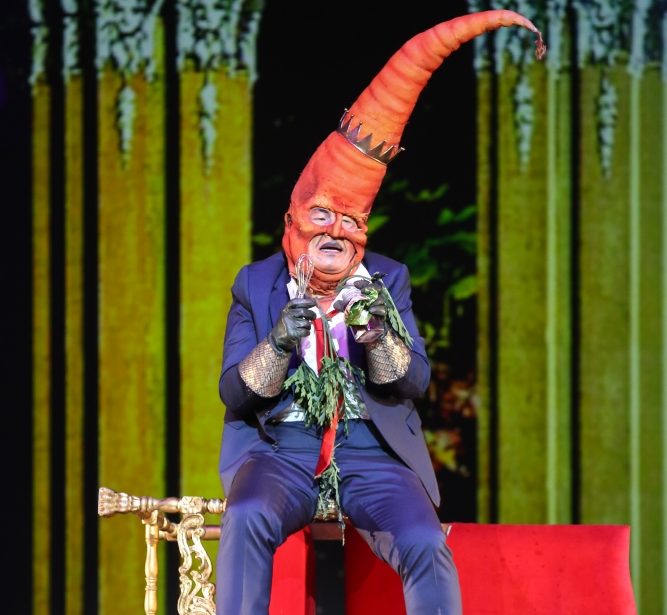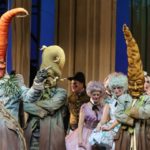 For Offenbach’s 200th, Vienna Volksoper celebrate the founder of operetta with a revival of König Karotte (1872), one of his greatest hits, a mix of comic opera (opera bouffa) and fairytale: live vegetables, witches and magicians. Beneath there’s a parable of ‘deeper meaning’: a political satire. While Offenbach’s music is irresistibly tuneful and rhythmic, the text, (Victorien Sardou, La Tosca), is witty and sarcastic, satirizing pompous, corrupt French society, with contemporary resonances. In Matthias David’s production, that King Carrot, rising magically out of the vegetable patch, looks uncannily like a certain President, is coincidental. And, in the story, even the people are laughably easily won over.
For Offenbach’s 200th, Vienna Volksoper celebrate the founder of operetta with a revival of König Karotte (1872), one of his greatest hits, a mix of comic opera (opera bouffa) and fairytale: live vegetables, witches and magicians. Beneath there’s a parable of ‘deeper meaning’: a political satire. While Offenbach’s music is irresistibly tuneful and rhythmic, the text, (Victorien Sardou, La Tosca), is witty and sarcastic, satirizing pompous, corrupt French society, with contemporary resonances. In Matthias David’s production, that King Carrot, rising magically out of the vegetable patch, looks uncannily like a certain President, is coincidental. And, in the story, even the people are laughably easily won over.
Curtain-up, a sneak preview of the cast, fabulous costumes, and those fantastic human vegetables (Suzanne Hubrich) that alone make your visit. The overture, bursting with Offenbach’s melodies and bouncing rhythms, is played by Volksoper orchestra under dynamic conductor Guido Mancusi. But Karotte isn’t Offenbach at his very best which –Tales of Hoffmann– truly belong in an opera house.
The opening number- Nobody cares who wins or loses, the common man takes the blame- is sung by lusty firemen, their girls bringing on boxes of pizza; but in 19th century Paris?
We see royal princes, like some middle-east oil magnates, with spiked-up blonde wigs. Prince what’s it – Fridolin 24th of Krokodyne- wears a royal blue velvet jacket, with gold insignia. Carsten Süss, when he gets the chance to sing, with his lyrical tenor, is the true star. His ‘good spirit’ Robin (cross-dressed Manuela Leonhartsberger) has to make him change his ways, reform his loose-living master. Robin sings he’s a registered student, has long nights: ‘desire is what drives us’. Leonhartsberger, no mean mezzo-soprano, sang Elvira in Volksoper’s Don Giovanni. Here she’s the bartender, serving frothy pints of lager (are they real?) We’re introduced to the Police Chief- also Head of secret service – in this corrupt regime. Sung by Marco Di Sappia, in military uniform, a real character, he’s a sort of MC, confiding in the audience. Sappia’s is a stand-out performance.
 The would-be Princess, who’s after Fridolin, appears dolled-up in a glitzy black mini, wearing fish-net stockings. The pretty, petite Julia Koci can really sing; an exquisite soprano. She sings, ‘In the matter of education, she was fluent in every convention’, while she flirts outrageously with Fridolin, the eternal party-goer. But in her aria ‘Alone with her love’, she sings endearingly, would that she could belong to him: she blows like the petals of a flower, sung with surprisingly high coloratura.
The would-be Princess, who’s after Fridolin, appears dolled-up in a glitzy black mini, wearing fish-net stockings. The pretty, petite Julia Koci can really sing; an exquisite soprano. She sings, ‘In the matter of education, she was fluent in every convention’, while she flirts outrageously with Fridolin, the eternal party-goer. But in her aria ‘Alone with her love’, she sings endearingly, would that she could belong to him: she blows like the petals of a flower, sung with surprisingly high coloratura.
Now the magic. Robin rolls on a magic globe that will lead to his aim; hence we’re on a magical mystery tour. But there are dark forces. Christian Graff – Juno in Offenbach’s Orpheus in the Underworld – now in tight black crinoline dress, high boots of course, and pulling on a pipe (smoking whatever.) Graff in drag is like the ugly pantomime sister to Koci’s Cinderella.
The pantomime witch, she’s conjuring up all manner of spells in front of a green picket garden fence. Ratatouille…At last things warm up. They rise up, humanoid vegetables- beetroot, leek, potato and carrot, like in a comic, non-spooky version of Michael Jackson’s Thriller.
In Offenbach’s send-up of the pomp and corruption of the court of Napoleon III, (succeeded by the First Republic), Prince Fridolin is on the throne. They sing, What gets you on in this country is who you know, ‘Name and Rank’: a roll call of who’s who (on the ladder of aristocracy.) Süss’s Fridolin, the focus of all this bling, lounges around in a black and gold spotted designer jacket.
King Carrot and the other veggies invade. Karotte (Sebastian Reinthaller) sings his signature, something like, He is King Carrot, Janon!…Yum Yum, the dance begins!
Robin rubs his magic box. Knights occupy the stage. It’s a palace coup, the veggies take power. The payback is a reward of a thousand for every voter. Hence the big number, singing about ‘The rise and fall of monarchy, the way it goes between Monarchy and Republic. Free elections; monarchy needs a revolution. The police chief now addresses the audience, as if reading out news sheets handed to him. And referring to ‘our friend Boris ‘asking the Queen, and she said yes. (Also,’in our ‘little Republic of Austria’, with a reference to Chancellor Kurz.)
There’s a funny scene with an old King 130 years old, who farts, and whose limbs are so brittle, he disintegrates, dismembered and decapitated: and reborn as a boy, with uncannily similar facial features. (A dig at the Divine Right of Kings?)
On the Prince’s travels (like Voltaire’s Candide), they come to Pompey- ‘grey walls greet them’; there’s a vegetable market; a sketch about Austrian Railways; and the eruption of the Volcano appropriately ends the first part, and sends us to the bar.
King Carrot fumbles hesitatingly onto the stage.  The vegetable heads mingle in high society: the joke is about flattery. Now the Royals wear token carrot insignia- small carrots on their heads- and King Carrot boasts he has ‘the confidence of the Cabinet.’ Yum Yum.
The vegetable heads mingle in high society: the joke is about flattery. Now the Royals wear token carrot insignia- small carrots on their heads- and King Carrot boasts he has ‘the confidence of the Cabinet.’ Yum Yum.
A mission from the Far East- selling coats, Jewels… It’s Offenbach meets Gilbert and Sullivan’s Mikado. But this is surreal. They are carrying a GIANT CARROT GRATER!! And we see carrot shavings on the stage. Carrot sits on it like a sex tool.
At last Offenbach in romantic mood. Süss’s Fridolin is on the throne. Du, in his duet with the Princess, (Koci now in some green and orange creation.) He sings ‘Do you really love me?’- She, My heart flies to you. Not quite classic Offenbach, but a reminder we’re in an opera house.
In the wildly erratic plot, Robin grants three wishes. The scene with the ants -always running, harvesting, hewing- is brilliantly staged, with LED lights behind a moving screen of grass/corn-sheaths. On the island of the apes, an ape jumps up and cartwheels across the stage (Konstantin Oberlik.) He eludes those trying to catch him. They eventually tie him up- (obviously pre-Animal Rights.)
And, to Offenbach’s heavenly theme, there’s a haunting ‘You help me bear my lot: with your love, you give me life,’ Süss and Koci sublimely sung.
Back to the political satire, while Carrot insists, only he can rescue the monarchy, it all ends in chaos. All services are at a standstill, but there’s a ban on political demonstrations to end the regime. (Sounds familiar!) End the tyranny of the ROOT VEG STATE! The Cabinet joins them in the fight. The public back the returned Fridolin- the real King is still alive!
King Carrot is debagged, and debunked. Bundled off in his shirt. (Poor Reinthaller is revealed at curtain call, his face caked in make-up, he’s had to wear that headgear all through.) Would that all failing Presidents could be so easily brought down. To end there’s a classic Offenbach, let’s rip, razzmatazz ensemble. So a triumph of costumery, but not the best of Offenbach. And, (unless you understand German), there are no English surtitles. © P.R. 5.1.2020
Photos: Featured Image © Thomas M. Jauk
Sung-Keun-Park (König Karotte); Julia Koci (Princess Kunigunde), Mirko Roschwoski (Prince Fridolin) © Barbara Pálffy/ Volksoper Wien
